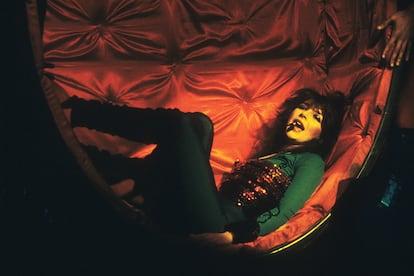“Is this what we want?”: Thousands of British artists back silent record against AI


More than a thousand British artists have decided to use silence to make noise in the face of the threat of Artificial Intelligence (AI) . Any user of the music platform Spotify, among other access routes, can now access a strange album, with twelve songs, produced and supported by musicians such as Kate Bush, Tori Amos, Annie Lennox or Jamiroquai. Its title: Is This What We Want? Twelve songs in which only silence can be heard. And if one pays attention, the domestic noises that flood a world without music, such as the hum of a heating system or the distant footsteps of someone prowling around a hallway.
The UK arts community has rebelled against the Keir Starmer government's Data Access and Use Act, which makes it easier for big tech giants to bypass intellectual property rights to use a wealth of works to train new generative AI models.
Each of the album’s twelve songs, in the order in which they are presented, is titled with a single word. Read one after the other, they express the artists’ stark denunciation of a future threatened by new technologies: The/ British/ Government / Must/ Not/ Legalise/ Music/ Theft/ To/ Benefit/ AI/ Companies.
Musicians, filmmakers and writers with a reputation, muscle and influence such as Paul McCartney , Andrew Lloyd Webber, Ed Sheeran, Sting, Dua Lipa, or the playwright Tom Stoppard have joined the battle against the new law. Those who have not decided to participate in the silent protest record have added their signature to a letter sent to The Times newspaper, in which they denounce a proposal “that represents an unconditional and absolute handover of the rights and income of the UK’s creative sectors to big tech companies.”
The Starmer government, desperate to breathe economic growth into a country that has been struggling to get off the ground in recent months , wants the United Kingdom to be the ally and gateway to Europe for the major American companies that today generate the main Artificial Intelligence models, and that need huge amounts of data and information to train their generative AI systems.
The new bill weakens the enormous protection of intellectual property that the British environment has always provided, making it the most comfortable and safe ecosystem for thousands of artists. The government's proposal establishes an exception to the rule regarding the training of generative AI systems, and exempts technology companies that intend to use existing artistic material from warning its authors. Unlike usual, it is the authors who must discover for themselves whether their work is being used and demand that it is not so.
The battle against the law has been led by filmmaker and documentary maker Beeban Kidron (Lady Kidron), director of, among many other films, the second installment of the saga of Bridget Jones . Is a member The House of Lords is an independent, non-partisan body, and thanks to its amendments, it has been possible to halt, for the moment, the parliamentary process of the new text. In the first vote that took place in the second Chamber (which, as in the case of the Spanish Senate, can block a text but not stop it definitively), a majority of 145 Lords to 126 supported the demand that technology companies be obliged to reveal the identity of the artists whose work they were going to use, as well as the purpose of their tests.
“AI can play a significant role in our economy, as can foreign companies. There is a clear opportunity for growth if we combine the arrival of AI with the creative industry. But the way to achieve this cannot be this forced marriage, in terms of slavery,” Kidron said.
The artists who support their battle share this tone, more cautious than belligerent. In the text sent to The Times, they point out that the creative industry contributes more than 150 billion euros to the British economy every year, and employs 2.4 million people every year. “They generate tourism, raise our position in the world and bring joy and community spirit to our citizens, while building a culture in which everyone sees themselves reflected,” they say in the letter.
All the signatories admit their desire to be part of the “AI revolution”, as they have done in the past with other technologies, but they call on the Government to protect intellectual property. “There is no economic or moral argument for stealing our copyrights”, they conclude.
EL PAÍS






